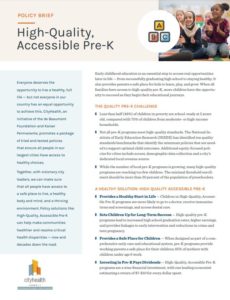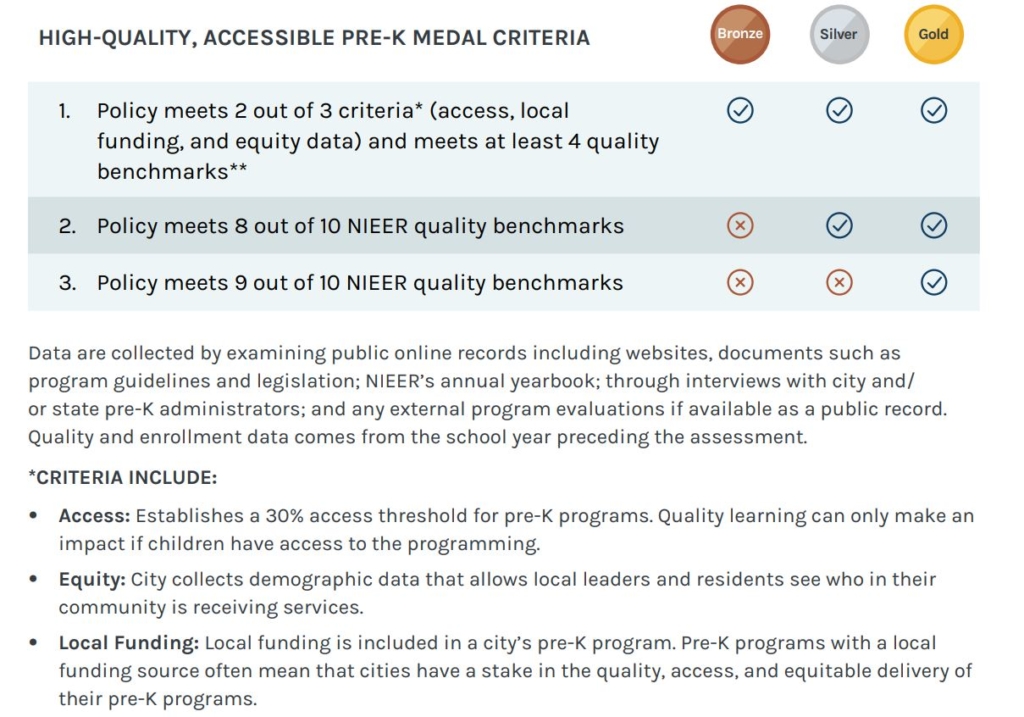This is the tenth blog in our monthly series exploring CityHealth’s 2.0 policy package. Sign up for our newsletter to learn about new policy solutions, tools, and resources.
It’s that time of year again. Over the past month, millions of students have returned to school to start the new academic year — including almost 1.5 million children enrolled in public pre-K programs. Nearly two and a half years into the COVID-19 pandemic, pre-K teachers and children are adapting to a new reality of a patchwork of masking requirements, persistent staffing shortages, and a sharp decline in enrollment that has erased a decade of growth.
Access to high-quality pre-K programs can set children up for long-term success. Mounting research demonstrates that early childhood education is an essential step to accessing opportunities later in life — from improved high school graduation rates to higher earnings as adults to better short- and long-term health outcomes. But according to the National Institute for Early Education Research (NIEER) at Rutgers University — CityHealth’s partner that supports our High-Quality, Accessible Pre-K policy — just 39% of 4-year-olds and 14% of 3-year-olds were enrolled in a public preschool program for the 2021 school year.
CityHealth and NIEER work with cities to strengthen the quality and increase the enrollment of local and state-funded pre-K programs. CityHealth’s High-Quality, Accessible Pre-K policy utilizes NIEER’s 10 pre-K quality benchmarks that set the minimal standards for a range of components — from maximum class size and teacher/child ratio to curriculum supports and learning goals. With the 2.0 version of the policy, CityHealth added additional equity-focused criteria, including a 30% access threshold, a requirement to collect demographic data, and inclusion of a dedicated local revenue source.
Pre-K Can Improve Health Outcomes
Public pre-K programs provide a safe place for children to learn, play, and grow — while also benefiting their health both directly and indirectly. Children in pre-K have greater access to health screenings, health care, improved nutrition, and other health-promoting activities. Pre-K programs can also result in greater household resources from increased parental employment and educational opportunities, which are associated with better health behaviors and outcomes.
screenings, health care, improved nutrition, and other health-promoting activities. Pre-K programs can also result in greater household resources from increased parental employment and educational opportunities, which are associated with better health behaviors and outcomes.
The health benefits associated with pre-K are wide-ranging; studies have suggested that early childhood education can be linked to higher immunization rates, healthier body weights, and lower child mortality. Pre-K’s impact on health can be seen far beyond childhood; researchers have found that adults who participated in pre-K programs as children have decreased smoking rates, lower rates of risk factors for cardiovascular and metabolic diseases, and overall better health outcomes than peers who did not participate in pre-K.
Pre-K: The Equitable Choice
Policies that promote High-Quality, Accessible Pre-K ensure all children can access the benefits of a pre-K program. Access to high-quality pre-K has proven especially beneficial for low-income students, as well as children with special needs and those who are dual language learners. These policies can also help close learning disparities; on average, Black children starting kindergarten are nearly nine months behind in math and almost seven months behind in reading compared to their White non-Hispanic peers. These gaps in math and reading skills are difficult to close and can impact later school success — making access to high-quality pre-K especially important.
Many pre-K programs haven’t been designed to meet the specific needs of families that have faced systemic and historical barriers to pre-K. To improve a pre-K program’s access, quality, and outcomes for all children, local leaders and residents need data that provides insight into who in their community is receiving services and who is not. CityHealth’s 2.0 criteria include a requirement to collect demographic data to help local leaders and residents understand a program’s accessibility.
Implementing Local Pre-K Programs
Public pre-K programs often have a mix of funding streams, from local property taxes to budget set-asides. CityHealth and NIEER created a resource for cities, City Funding Strategies to Support Public Pre-K Programs, to explore how different cities have used various funding options for pre-K programs. Even if a pre-K program has federal or state funding, local funding for pre-K programs often means that cities have a stake in the quality, access, and equitable delivery of their pre-K programs. For that reason, local funding was included as a criterion in CityHealth’s 2.0 policy assessment.
Cities that invest in high-quality pre-K programs can also see financial and social returns
for children, families, and the larger community. When San Antonio established its Pre-K 4 SA program in 2012, the city saw a nearly 10% increase in public pre-K enrollment, with Black and Hispanic students constituting a majority of children served. San Antonio’s program provides critical family education and support — as well as professional development opportunities — making it a holistic program that benefits students, families, and teachers alike. Studies on Pre-K 4 SA have shown that students who enrolled in the program had improved reading and math skills, better school attendance, and fewer special education referrals.
A Self-Assessment Framework
In 2018, CityHealth piloted the Pre-K Learning Network, a program designed for city early education leaders to learn from each other, improve their practice, and establish connections beyond city limits. The learning network created a framework for cities and local school districts to help cities improve their early education programs. The framework is a self-assessment tool designed to compare how well a city’s pre-K program aligns with the existing evidence base of best practices. While the framework utilizes the NIEER benchmarks, the tool goes beyond CityHealth’s medal criteria and provides practitioners with a method to rigorously assess their pre-K programs and identify areas for quality improvement.
CityHealth’s 2.0 Criteria
Starting in 2022, CityHealth will assess the nation’s 75 largest cities on their High-Quality, Accessible Pre-K programs using the updated, 2.0 medal criteria. Cities can earn a gold, silver, or bronze medal based on how the city performs in these key areas:
**Benchmarks are available here.
CityHealth is a resource for city leaders, policymakers, and advocates pursuing policy change that can help all residents live healthy, full lives. Have a question about High-Quality, Accessible Pre-K or any of our other policies? Please feel free to send us an email, and join us to learn more about the tools, research, and technical assistance opportunities from CityHealth and our partners.




 Katrina Forrest, J.D., and Catherine Patterson, MPP, are CityHealth’s Co-Executive Directors.
Katrina Forrest, J.D., and Catherine Patterson, MPP, are CityHealth’s Co-Executive Directors. 

